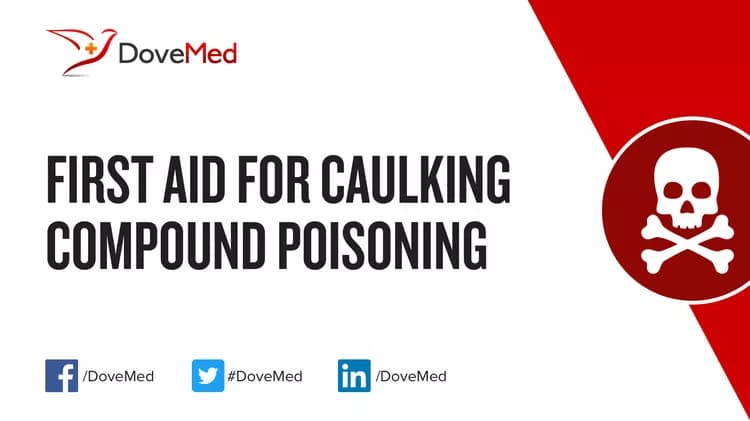What is Caulking Compound Poisoning?
- Caulking compounds are sealing compounds used for preventing air or water entry into buildings through door and window cracks or joints. A caulk is a soft, putty-like material made from various chemicals
- Caulking Compound Poisoning is the accidental or intentional intake of the compound
- The condition is diagnosed based upon the clinical history, combination of signs and symptoms, and additional tests (that may include, in some cases, radiological studies and laboratory tests)
Caulking Compound Poisoning may be also referred to as Caulking Compound Toxicity.
What are the Causes of Caulking Compound Poisoning?
- Caulking Compound Poisoning is caused by the ingestion (swallowing) of caulking compound. The compound may also get into the eye, resulting in eye-related symptoms
- This intake could be accidental, or in some cases intentional, to bring self-harm
- Caulking compounds are of several types such as acrylic caulk, latex caulk, and caulking cord. These may be made of acrylic, neoprene, polysulfides and polyurethanes, silicone, and vulcanized rubber. Some of these substances are toxic to humans
Note: The compound can interact with other prescribed or non-prescribed medications in the body. Such interactions may enhance the therapeutic effects of other medications being taken, resulting in undesired side effects.
What are the Signs and Symptoms of Caulking Compound Poisoning?
The signs and symptoms of Caulking Compound Poisoning can vary from one individual to another. It may be mild in some and severe in others. Several systems of the body, such as the vascular system, digestive system, respiratory system, nervous system, and ENT may be affected.
The signs and symptoms of Caulking Compound Poisoning may include:
- Irritation of the mouth, nose, and eyes, resulting in runny nose and watery red eyes
- Burns in the mouth, throat, and food pipe, resulting in irritation and pain
- Swallowing difficulties; coughing
- Nausea and vomiting (blood in vomit)
- Blood in stool
- Breathing difficulties (due to inhalation of the compound)
- Skin burns
- Numbness and tingling sensation
- Feeling dizzy, lack of coordinated movement
- Sudden drop in blood pressure (hypotension)
- Stomach pain
- Vision abnormalities including partial or complete vision loss
- Loss of consciousness
How is First Aid administered for Caulking Compound Poisoning?
First Aid tips for Caulking Compound Poisoning:
- Call 911 or your local emergency help number, for emergency assistance
- Call the Poison Control Center at 1-800-222-1222 (or your local poison control center) for further instructions
- Provide them with information such as the compound taken, quantity and time of ingestion, age, weight and general health status of affected individual
- Confirm that the airways are protected; also, ensure breathing and the presence of pulse
- If exposure of the eye has occurred, then wash thoroughly with copious amounts of water
- Unless instructed by a healthcare professional, DO NOT induce vomiting in the affected individual
- Following an ingestion of the substance, immediately give water or milk to drink
- In case of symptoms that indicate difficulty in swallowing including vomiting or decreased alertness, do not give anything by way of mouth
- Take individual to emergency room (ER) for further treatment
- Always try to take the compound bottle/container to the ER
The emergency medical health professional might perform the following steps towards treating the condition:
- Medically manage symptoms
- Provide breathing support, if necessary
- Wash eyes repeatedly and thoroughly (irrigation), to eliminate any remaining compound
- Administer fluids by an intravenous drip line
Who should administer First Aid for Caulking Compound Poisoning?
First aid for Caulking Compound Poisoning is administered by healthcare professionals.
- The individual who is affected, or someone near, should call 911 for emergency assistance (or the local emergency number)
- They should also call the poison control center at 1-800-222-1222 (or the local poison control center) and follow instructions
What is the Prognosis of Caulking Compound Poisoning?
- The prognosis of Caulking Compound Poisoning is dependent on the amount of substance consumed, time between consumption and treatment, severity of the symptoms, as well as general health status of the patient
- If the individual can recover from the symptoms, with appropriate medication and early support, the outcome is generally good
- In case of severe poisoning and delayed medical attention, the outcome may be adversely affected and prolonged treatment and time for recovery is expected. In some cases, the damage may continue to take place, even following ceasing of further exposure
In general, toxicities are common situations in the emergency departments. A majority of the cases are often not fatal, when appropriate treatment is given.
How can Caulking Compound Poisoning be Prevented?
Caulking Compound Poisoning can be prevented by:
- Always following instructions for usage of any household products
- Keeping any poisonous/hazardous chemicals and other materials out of children’s reach
- Keep all poisons correctly labeled and in suitable storage locations
- Using appropriate protective wear when working with such chemicals
- Being aware of basic first aid steps in case of an emergency (such as inadvertent poisoning)
What are certain Crucial Steps to be followed?
- Call 911 (or your local emergency number) for emergency assistance, if symptoms are life-threatening
- Call Poison Control Center at 1-800-222-1222 (or the local poison control center) and follow the recommend steps
- It would be helpful if the following information is readily available:
- Type, amount and time of consumption of the substance
- Age and weight of the individual
- And, the overall health status of the individual
Related Articles
Test Your Knowledge
Asked by users
Related Centers
Related Specialties
Related Physicians
Related Procedures
Related Resources
Join DoveHubs
and connect with fellow professionals


0 Comments
Please log in to post a comment.